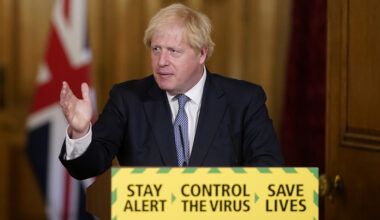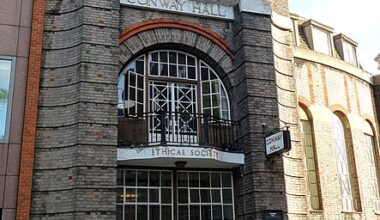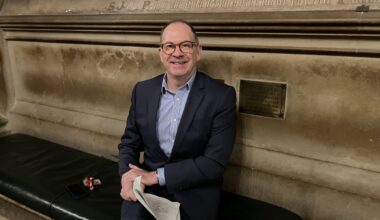The thraldom of government to the minimal state must at some point come to an end. We have, as the well-known quote by Gramsci goes, reached a point where the old is dying and the new cannot be born. The decomposition is in evidence all around us. Wages are stagnant, economic growth is non-existent, and public services feel as if they are permanently on the brink of collapse.
Populism is just one morbid symptom of this death rattle of neo-liberalism. And it is a grim irony that politicians who have spent the preceding decades advocating for less government (border controls notwithstanding) are among the chief beneficiaries of public discontent with the decaying status quo.
During this decades-long retreat of the state, religious groups have often been feted by successive governments as alternative providers of local services. As a result of the austerity policies pursued by the Conservatives and Liberal Democrats following the 2008 financial crisis, local authorities were encouraged to outsource local services to the private sector and voluntary organisations. Welfare cuts also saw a proliferation of food banks run by religious groups including the Trussell Trust and the Open Kitchen.
Some of these interventions—so long as the providers have managed to eschew proselytization, which is not always the case—have been relatively benign. However, other faith-based interventions in the public realm, some of which predate the latest round of austerity policies, are more troubling.
This has been particularly evident in education policy, where state-funded religious schools today provide around a third of non-fee-paying education in Britain, an increase from around a quarter in England when Tony Blair became prime minister in 1997.
Blair never disguised his proclivity for all things faith-based, and it was his government that cleared the way for a new generation of state-funded religious schools. Prior to the 2001 election, Blair told a conference of faith groups that church schools were a pillar of the education system, ‘valued by very many parents for their faith character, their moral emphasis and the high quality of education they generally provide’.
Politicians have often justified the proliferation of state-funded faith schools by falling back on the modish concept of parental ‘choice’.
Blair’s veneration of religious schools (not unrelated to his preference for the private sector over the public realm) has continued under his successors. In the early 2010s, the Coalition government of David Cameron gave the go-ahead to a raft of new faith schools as part of its free schools programme. Shortly after coming to office in 2016, Cameron’s successor Theresa May announced that her government also intended to increase the number of faith schools—despite the fact there that was no mention of the policy in the 2015 Conservative Party manifesto.
During her short tenure as prime minister Theresa May also announced plans to remove a rule (introduced in 2007) that prevented state-funded faith schools from selecting more than 50% of pupils based on their parents’ religious beliefs. Before losing the 2024 General Election, Rishi Sunak’s government made similar plans to abolish the cap, largely at the behest of the Catholic Church, which has refused to open any new schools under the rule, claiming the cap would force them to turn away Catholic families and contravene canon law (not true).
Politicians have often justified the proliferation of state-funded faith schools by falling back on the modish concept of parental ‘choice’. This has coexisted with an ideological preference for less government that has animated almost every leading British politician since Margaret Thatcher. As to the evidence base for outsourcing education to religious denominations, many have drawn on context-free claims about the supposedly superior performance of faith schools. A 2001 government green paper welcomed Church of England proposals for a hundred extra church secondary schools on the basis that they ‘have a good record of delivering a high quality of education’. For Theresa May, faith schools were ‘more likely to be rated good or outstanding by Ofsted, and there is growing demand for them’.
And yet apologists for state-funded religious schools are significantly more reticent about how these impressive sounding results have been attained. In reality, faith schools achieve better than average exam results because their pupils come from wealthier-than-average families. A 2016 report by the Education Policy Institute found that disadvantaged pupils are under-represented at faith schools, while those with high prior attainment are over-represented. The report also found that faith schools take a significantly lower proportion of children on free school meals than other schools.
A re-examination of the prevailing consensus on faith schools is required in light of the growing realisation that there is such a thing as society.
Politicians have sometimes inadvertently drawn attention to such inequalities. During a visit earlier this year to the Cardinal Vaughan Memorial School in Kensington and Chelsea, Rishi Sunak’s then-education secretary Gillian Keegan announced her own plans to abolish the 50% cap on religious admissions to new faith schools. ‘Our faith schools are some of the best performing in the country’, she declared. What she failed to disclose was that the school chosen for the speech—purportedly an exemplar of the benefits conferred by a faith-based education—was one of the most socio-economically segregated schools in the country. Just 11.7% of pupils at the Cardinal Vaughan Memorial School are eligible for free school meals, compared to 33% in mainstream state secondary schools in the same borough. In other words, faith schools have reintroduced educational segregation by the back door.
Such inequalities matter on their own terms: why should the offspring of wealthy parents receive a superior education (and by extension, first dibs when it comes to landing a place at a top university and a plum job) over those whose parents happen to be poorer? And then there is the damage to social cohesion wrought by segregating children based on the religious beliefs of their parents. Social mixing is good for everyone. A lack of it has been known to lead to outbreaks of disorder such as we saw in parts of England, Wales, and Northern Ireland back in August.
As the late historian and social critic Tony Judt observed almost three decades ago, stripping back the state has become the cant of our time. If only the same scrutiny were applied to the forces that have ineluctably encroached on the spaces vacated by the state. A re-examination of the prevailing consensus on faith schools is required in light of the growing realisation that there is such a thing as society. Our children deserve better than entrenched segregation and division.
Related reading
Faith schools: where do the political parties stand? By Stephen Evans
Religion and belief in schools: lessons to be learnt, by Russell Sandberg
What secularists want from the next UK Government, by Stephen Evans
The case for secularism (or, the church’s new clothes), by Neil Barber
Secularism is a feminist issue, by Megan Manson
Faith and charity law: time for a rethink, by Megan Manson
Keir Starmer must bring the UK’s diverse but divided people together, by Megan Manson









Your email address will not be published. Comments are subject to our Community Guidelines. Required fields are marked *
Donate